IKSHA Sangama 2024 Report
There are moments when an idea starts to become a paradigm and even more critically, a transformation of consciousness. We are at the cusp of such a moment in Indian Knowledge Systems (IKS).
Dr. Manohar Shinde (Chief Convenor, IKSHA Sangama 2024)
It is a sense of purpose and a greater good that has made this togetherness possible. This IKSHA is a Sangama of the best influencers, thinkers, scholars of Bharat today. Let us invite each other to walk through the possibilities and commitment to exert the glory of Bharat.
Dr. Neerja Gupta (Vice-chancellor, Gujarat University)
The IKSHA Sangama, an annual confluence of brilliant minds devoted to the furtherance of the Indian Knowledge Systems, is one of the key vehicles conceived by the Indian Knowledge Systems and Heritage Academy (IKSHA). The 2nd edition was organized by IKSHA and co-sponsored and hosted by the Vice Chancellor of Gujarat University, on December 14-15, 2024 at the campus of Gujarat University, Ahmedabad.
165+ participants from Bhārata and abroad, comprising academics, independent researchers, and entrepreneurs/specialists saw the event unfold on the culturally rich soil of Gujarat. Chaired by Śrī Abhinava Shankara Bharati Ji of Śrī Kudali Sringeri Mahasamsthanam and other great spiritual leaders of institutions such as Chinmaya Mission, Akshardham and Ramakrishna Mission, the rich schedule offered varied opportunities for deep engagement, explorations and interactions with a vision of creating a committed fraternity and invest in strategic, long-term collaboration.
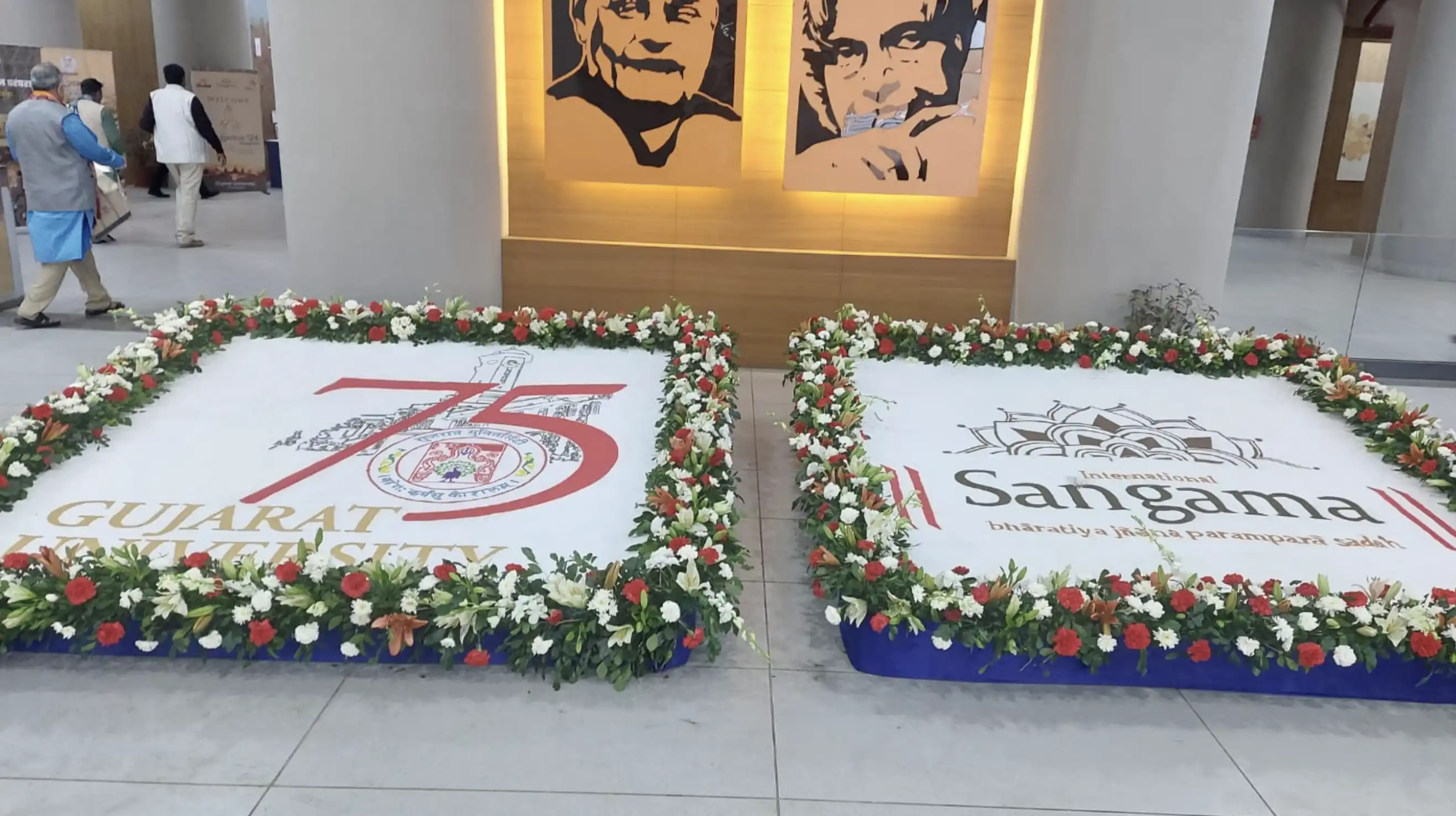
The IKSHA Sangama therefore was an attempt to galvanize and secure such human and institutional processes. It was a churn of and an offering to dharma. Its objectives can be further be understood as:
- Build an emergent IKS ecosystem nationally and globally.
- Provide a platform for diverse stakeholders making meaningful efforts for advancement of IKS.
- Strengthen confidence and build positivity amongst the IKS community through awareness of the present scale of resources and initiatives.
- Identify opportunities for collaboration between academia and industry, domain experts and entrepreneurs.
The Sangama saw the coming together of the great spiritual gurus of Bhārata, institutional heads and academic scholars, independent scholars of IKS, entrepreneurs and independent platform heads and skilled artistes/scholars belonging to the fraternity of the Indian classical arts.
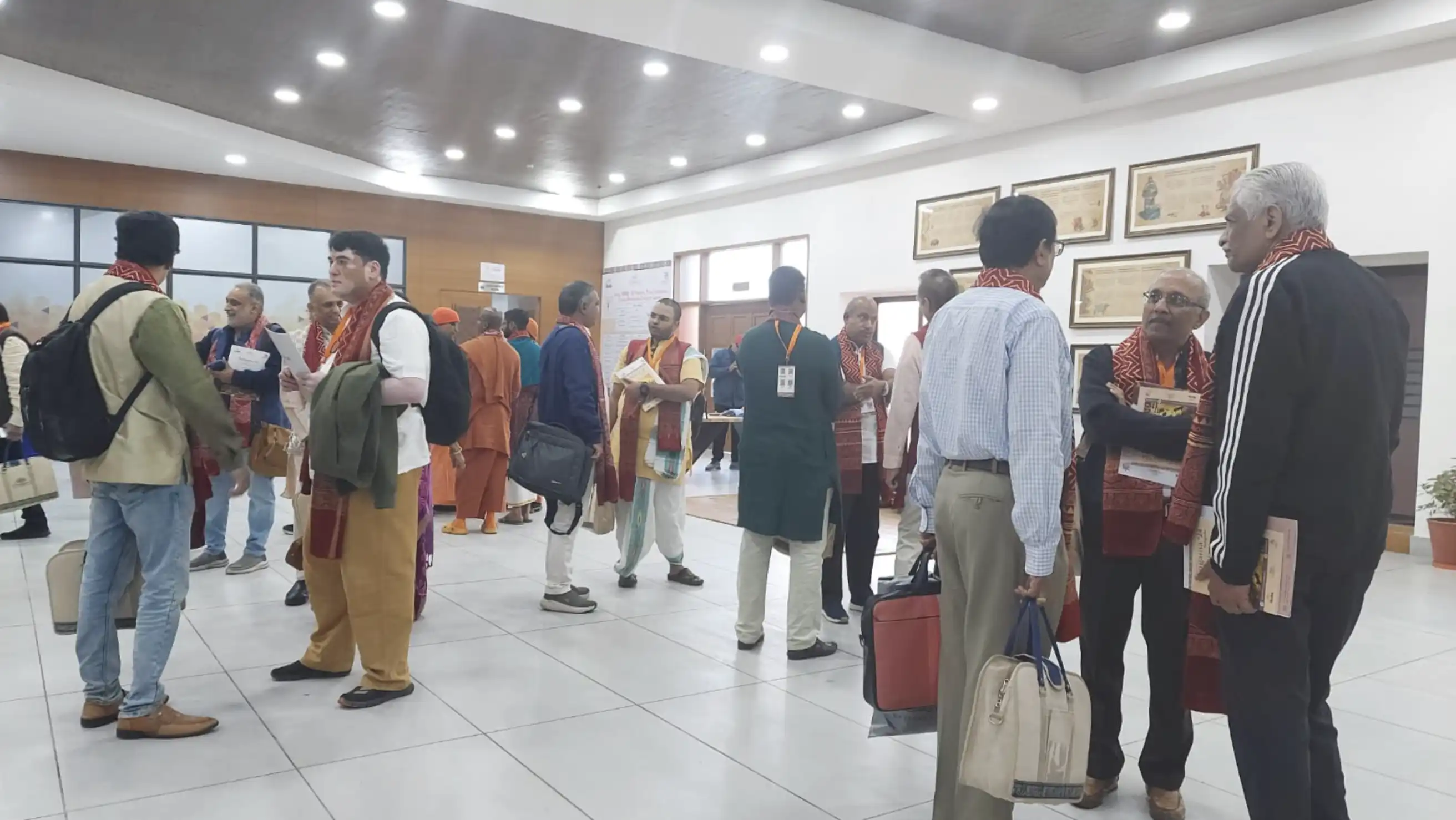
Summary of Proceedings
From the Himālayas across the Vindhyas to the shores of Rameswaram in the south, Bhārata is a land permeated by the sacred in both her knowledge systems and daily cultural realities. In the Indian episteme, the material systems are also emergent from the philosophy of the sacred, i.e. it is parā vidyā (spiritual knowledge) that also informs aparā vidyā (material knowledge). It is this millennia-old tradition and also an emotion that binds her people as was evidenced by the inaugural ceremonies of the IKSHA Sangama.
Delegates were welcomed by a team of dedicated young volunteers with the auspicious tilaka and ceremonial shawls. The vaidika mantra ghoṣa at the entry of Jagadguru Sannidhāna Śrī Abhinava Shankara Bharati Ji of Śrī Kudali Sringeri Mahasamsthanam was a deeply transformative moment for all of us. The program commenced with a traditional kanyā pūjana - invoking the presence of śakti, the supremely graceful and all-powerful cosmic maternal force into the sabhā, through offerings made to the young girls. The ceremony was presided over by Śrī Abhinava Shankara Bharati Ji, all the sannyāsins present and the elders amongst the delegate group.
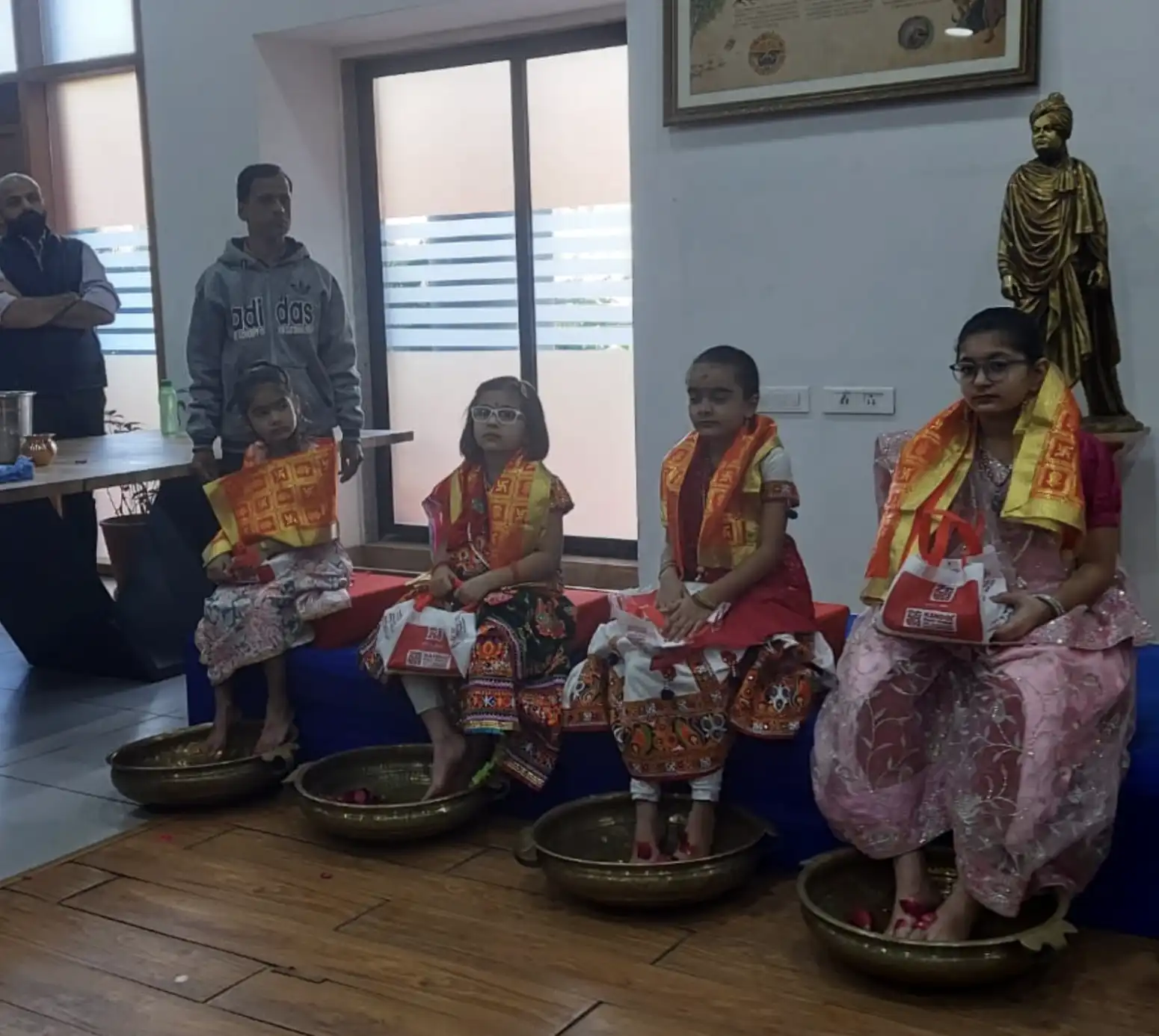
Post the opening of the stage with vaidika incantations and a warm welcome to the delegates, the dharma-ācāryas were invited with due honor to preside over the formal inaugural ceremony. Dr. Neerja Gupta (Vice Chancellor, Gujarat University) offered an inspiring welcome address, followed by a brief introduction to the genesis and goals of IKSHA by Śrī M.S. Chaitra. Śrī Raghava Krishna (Founder, Bṛhat) further set the context with a walkthrough of the key objectives of the IKSHA Sangama and the broad structure that would be followed for the next two days.
Staying true to the sacred spirit of Bhārata, the great ācāryas of sanātana dharma were invited for their āśīrvācanas and mārgadarśana for every individual gathered in the hall and through them, the larger collective. Śrī Abhinava Shankara Bharati ji offered his benediction and insights on what truly constitutes Bhāratīya jīvana dṛṣṭi and why it is critical that this informs our education system.
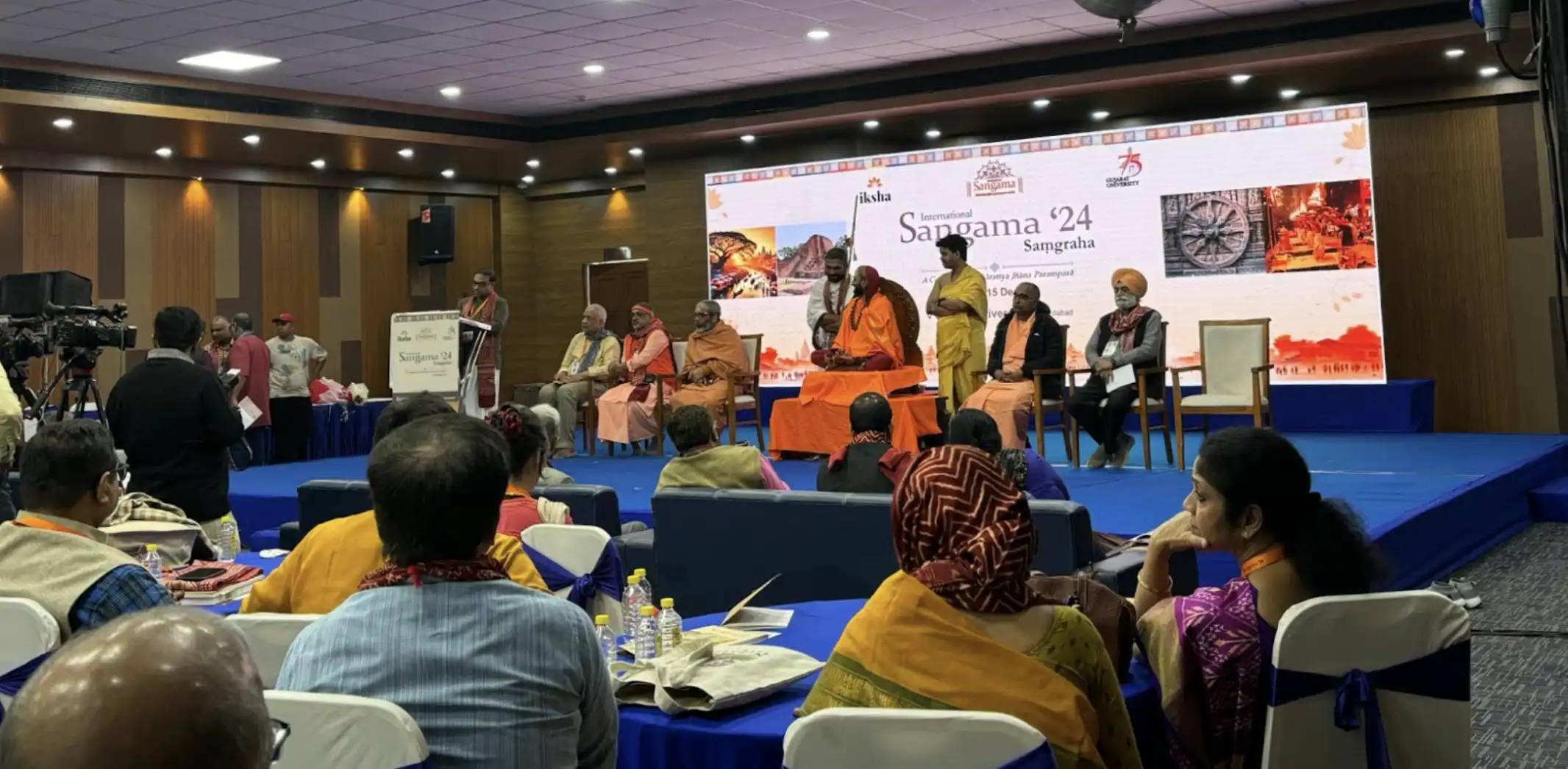
Svāmi Chidananda Puri ji (Advaita Ashram, Kerala) highlighted the centrality of ṛta - the cosmic order for a harmonious dhārmika living. Svāmi Mitranandaji (Acharya, Chinmaya Mission) laid emphasis on saving the Bhāratīya family, for if that institution breaks, the entire nation is doomed! He offered guidelines on devising modern strategies to communicate age-old wisdom to the generation of today.
Svāmi Bhadreshdas Ji (Ācārya, Swaminarayan Sanstha) offered a delightful address on the greatness of Bhārata and why the youth must be deeply proud of their legacy - for it is one that holds the key to flourishing global futures. He stated that from love alone does knowledge and innovation emerge.
Svāmi Narasimhanand Ji (Ācārya, Ramakrishna Matha) further offered key insights on the direction that education in Bhārata must take and Prof. Jagbir Singh Ji (Chancellor, Central University of Punjab) in a critical address laid out the deep linkages between the principles of the Sikhs and sanātana dharma. The keynote address by Śrī Pawan Gupta ji (Co-Founder, SIDH) integrated various dimensions of what IKS can mean for the different groups gathered. He thereby set the direction for the focus group discussions of the day.
The delegate group was divided into 6 key focus groups as follows:
- Moksha - Spiritual Leaders, Gurukulam Institution Heads
- Yajna - Public Institution Leaders
- Karma - Academic Scholars
- Dharma - Independent Scholars
- Dana - Technology, Management, Entrepreneurship
- Tapas - IKS Platforms, Private Institutions, Cultural Personalities and Ecosystem Leaders
For two hours, the groups engaged in intensive intra and inter group discussions on the topic: “What is IKS for your fraternity?”
The discussions spanned across the definition, challenges, opportunities, impact and suggestions for scale in their respective domains.
The Moksha group shared points critical to shaping and reinstating the centrality of the spiritual and gurukula ecosystem of Bhārata to national well-being:
- Expanding the role of maṭhas in society
- Preservation of and research in multiple vaidika sciences
- Reflecting upon and honoring the role of a spiritual scholar in society
- Avoidance of exam-centric attitudes in śāstra studies
- Finding the relevant balance between the gurukula system and the modern education system
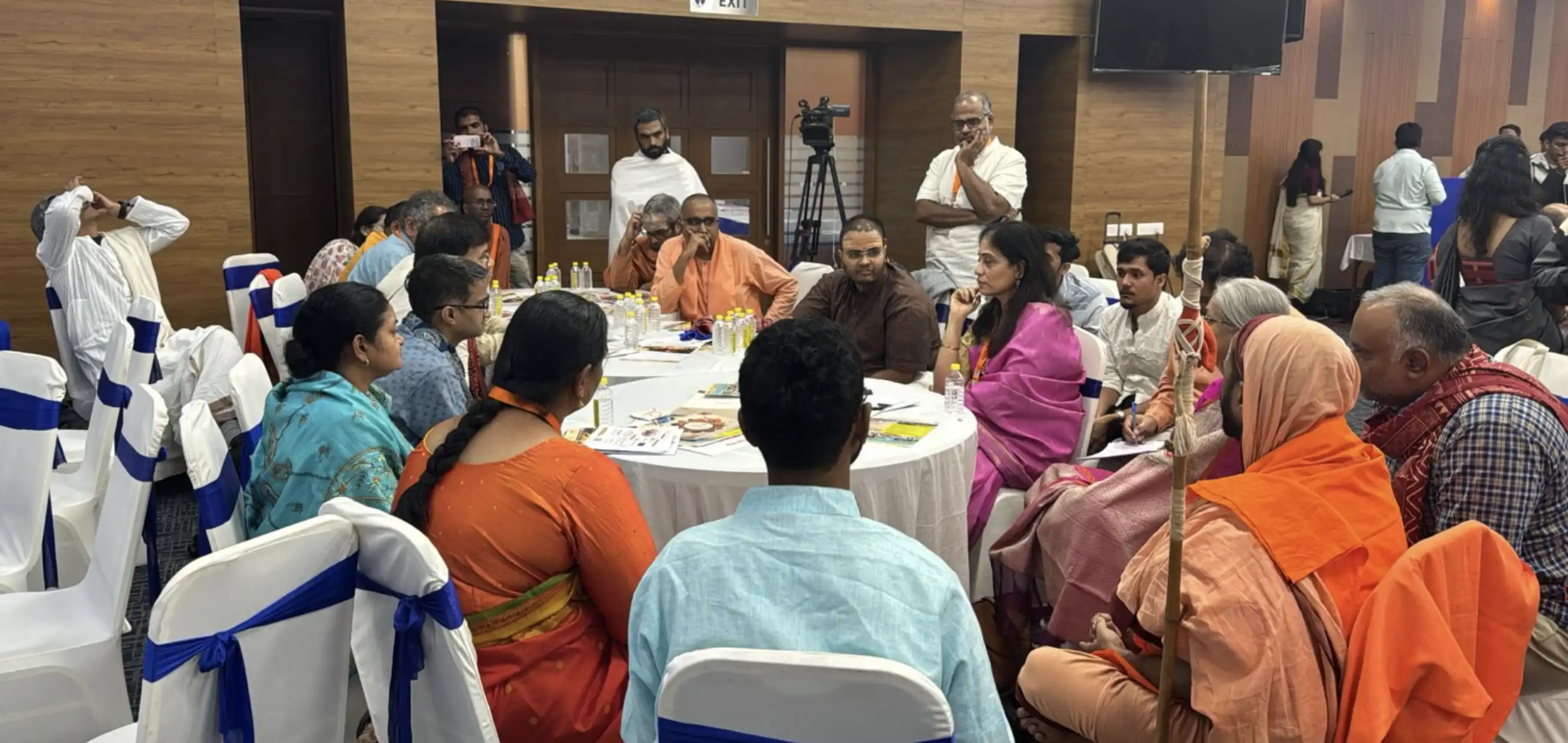
The Yajna group outlined both - challenges faced when trying to implement IKS in higher educational institutions, and their potential solutions for scale. They listed the challenges as lack of acceptability of IKS within the education system, absence of tangible measures of outcomes of IKS courses and critically, a lack of sponsorships and funding.
In terms of solutions, they highlighted:
- A special university for IKS
- Organizing National IKS Youth Conferences
- Promotion of research projects in IKS
- Focus on quantity to build momentum
- Multi-disciplinary design for IKS courses
- Increasing visibility within the campuses
Next, the participants of the Karma group highlighted various challenges such lack of both teacher and student interest, the need for a coherent understanding of what IKS and the Bhāratīya dṛṣṭi mean and absence of adequate research opportunities in the domain.
They listed a set of tangible suggestions, key to academia as a whole:
- Create expert faculty and 100 subject matters for every stream in IKS
- Pedagogical training and capacity building
- Articulate what IKS can offer for today’s grand challenges
- Produce high-quality multimedia material and make it accessible and lucid
- Leverage technology to benefit IKS
- Central focus on primary and secondary education
- Create dedicated Saṃskṛta programs to bridge research gaps
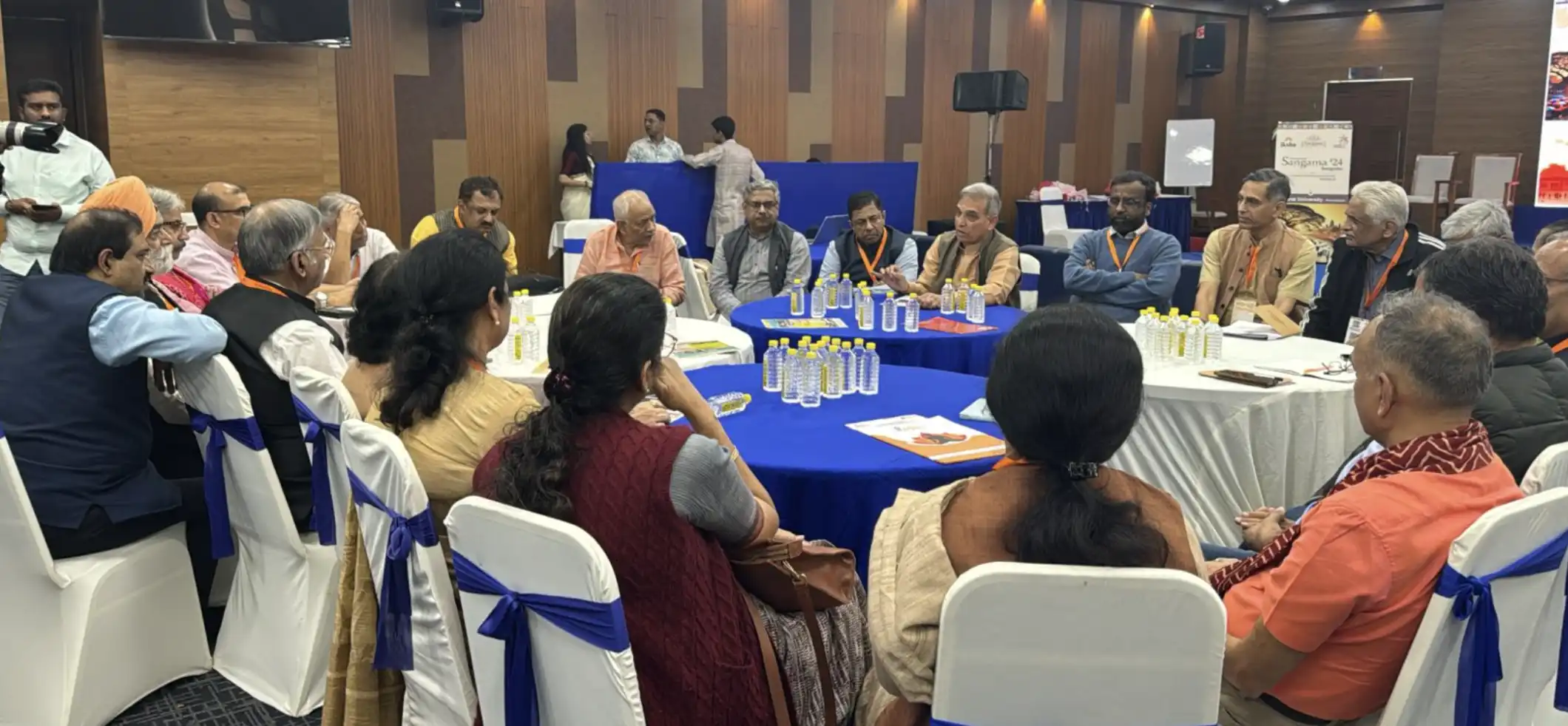
Participants of the Dharma group emphasized the criticality of networking between academia and independent scholars. They highlighted challenges faced by independent scholars such as institutional bureaucracy, highly centralized gatekeeping, lack of access to resources and low acceptance of experiential methods in the present taxonomy of academia.
Their suggestions were key to the integration of IKS in academia while retaining the independence of individual scholars:
- Need for systemic decentralization
- Creation of new taxonomies for IKS as a domain of knowledge and research
- Amplify authentic independent voices contributing to knowledge production
- Knowledge creation in technology and consciousness studies by academia
- Increased research in Saṃskṛta
- Create review mechanisms to understand how a discipline in IKS is performing
- Incorporation of traditional Indian research methods
The participants of Dana, representative of the aspirations of the young people of Bhārata, offered unique suggestions for IKS such as:
- Integration of games and experiences in IKS
- Push for technological advancements in IKS
- Raising IKS awareness and career opportunities
- Global Knowledge Systems awareness : a healthy comparison with China and South Korea
- Need for technological infrastructure in IKS
- Role of technology analysis and language models in IKS
- Preservation of yoga and cultural heritage through technology
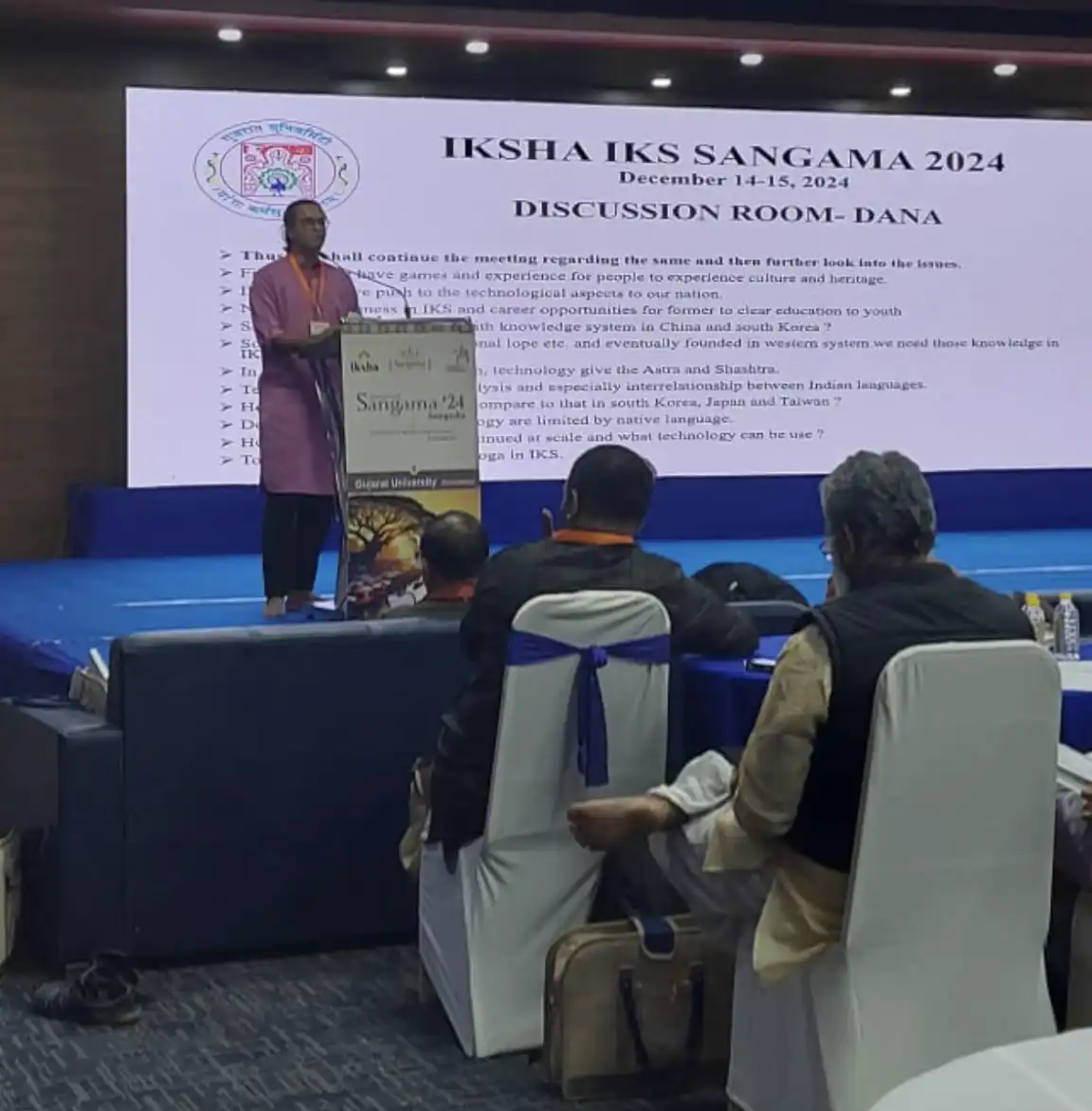
The Tapas group with the largest representation, outlined challenges such as limited policy initiatives, lack of organized efforts, an anglo-driven bureaucracy, research gaps specifically in arts and culture, lack of digital content in regional languages, a youth that is disconnected from the IKS worldview leading to challenges in identifying committed individuals and creating a sustainable ecosystem for scholars and practitioners.
They identified potential solutions as:
- Policy and Systemic Interventions
- Integrate IKS into jurisprudence and bureaucracy for systemic transformation.
- Advocate for CSR policies supporting IKS initiatives.
- Research and Resource Development
- Establish platforms for authentic content creation.
- Ensure documentation efforts are linked to the National Manuscript Mission.
- Ecosystem Building
- Set up an IKS Venture Capital initiative to fund scalable projects.
- Build an ecosystem for continuous exchange of ideas.
- Public Outreach and Youth Engagement
- Reintroduce the Indian worldview to youth through accessible formats.
- Promote cultural narratives in films and popular media.
Day 2 commenced with an insightful series of presentations by various organizations doing yeoman service in the domain of IKS such as Ayurvaid, Bṛhat, BbsAI, Centre for Sustainability, Dharma Civilization Foundation, INDICA, Sanskriti Foundation, Vidyakshetra, Poorna Pramathi, Vyoma Labs and the Punarutthan Foundation.
The focus groups then re-convened for a brief discussion on the pointers that had emerged on the previous day and listed pertinent questions they had for other groups. A consequent inter-group round of questions and answers, and key takeaways, demonstrated how each of the above defined categories are inherently inter-dependent and must grow together as an ecosystem that would anchor global futures.
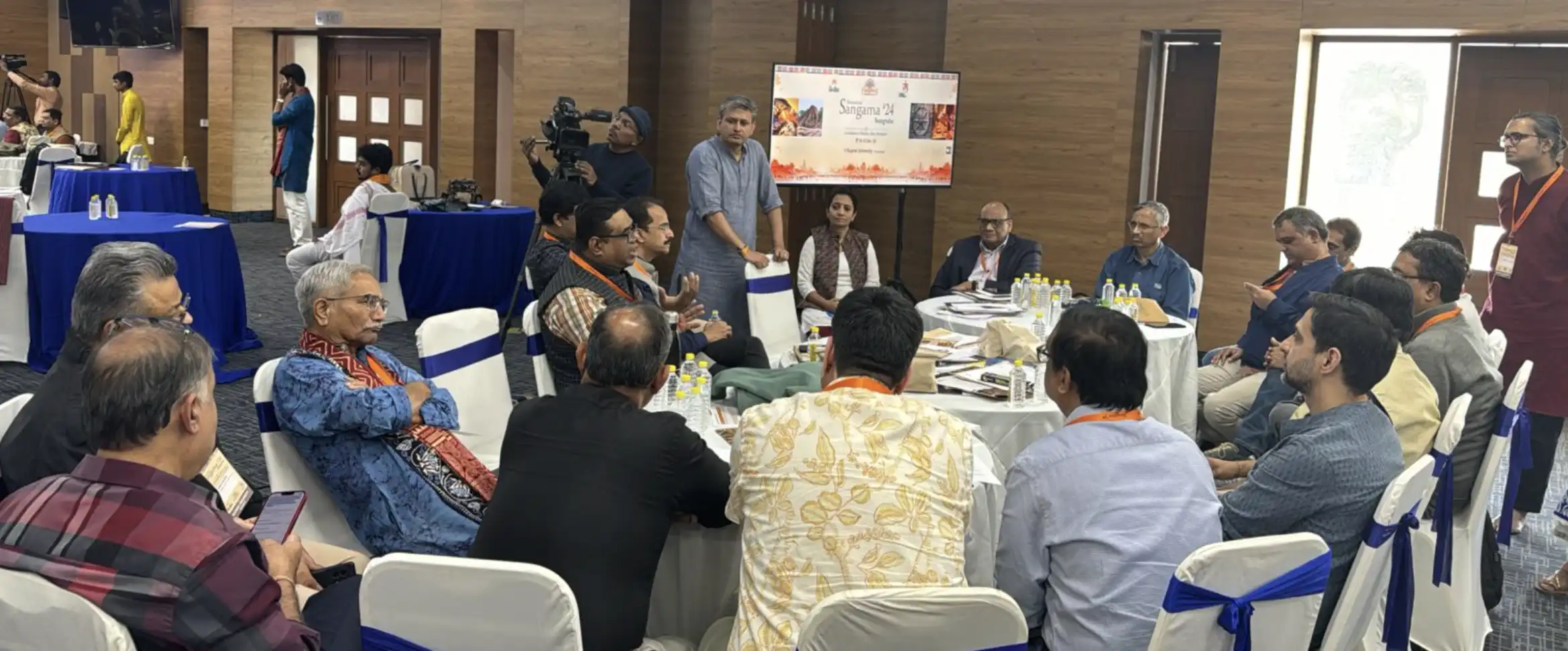
The IKSHA Sangama, a mega-confluence of the best of minds in the domain, concluded with a Mukta Cintana and concluding remarks by Śrī J. Nandakumar ji and Dr. Manohar Shinde Ji.
While summarising the proceedings of the Sangama, they also laid out a roadmap of execution for the year ahead as follows:
- Identifying core areas of research in the domain of Indian Knowledge Systems
- Develop high-caliber research candidates for the above
- Create institutions of higher learning for IKS
- Whatsapp groups for each focus group that meets once a month to further the agenda, and then meets together with other groups as well, thereby promoting inter-disciplinary formulations
The Sangama emerged as a critical intervention on many fronts.
With every minute detail from the stay, the ambience of the event, the meals served and the scale of the event being deeply Bhāratīya at core - the host institution has rightfully risen as one to be emulated by others in academia.
165+ minds and hearts have found a high-potential long-term fraternity to belong to, one that has the commitment of undertaking specific initiatives for furtherance of IKS in education and academia.
Finally and most critically, the confluence was presided over by the spiritual leaders, the dharma-ācāryas of Bhārata - marking an indelible return to the sacred core that animates every pore of this magnificent ancient civilization.
She guides, they radiate.
They guide, we follow.
Unto Her, we surrender all efforts.
Jai Mā! Jai Hind!
